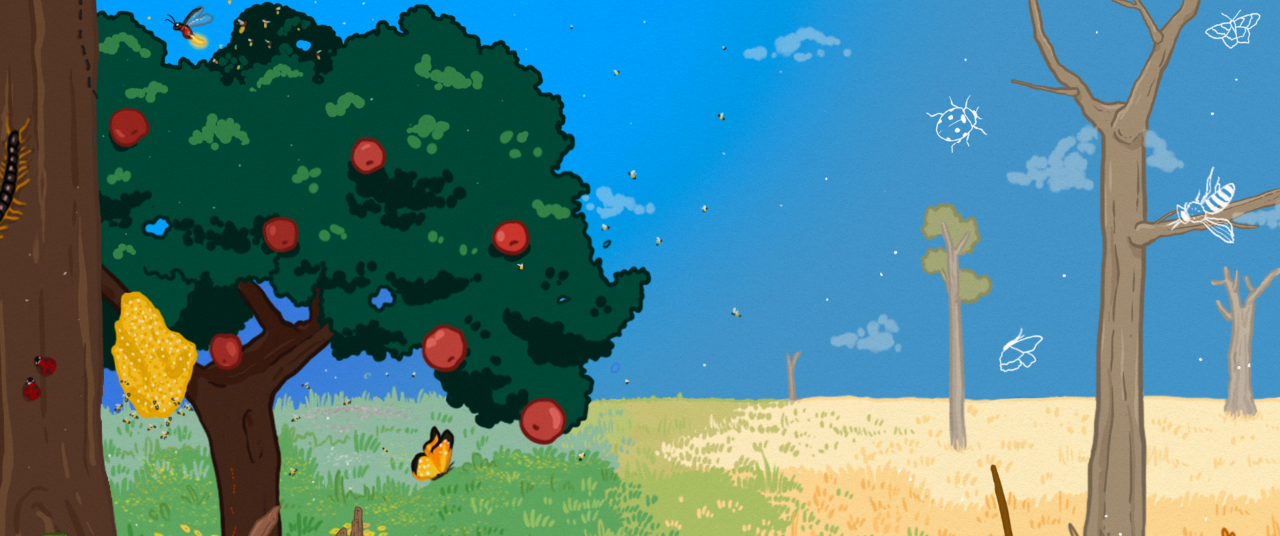Reddy is on a mission to convert more farmers to zero-budget farming






Jagadeesh Reddy grew up watching his grandfather lovingly tend to their family farm in Chittoor, Andhra Pradesh. When Reddy’s father later used chemical fertilisers and pesticides on the farm, he felt a sense of loss.
When it was Reddy’s turn to care for the family farm, he decided that it would be completely chemical-free. He was drawn to the zero-budget natural farming (ZBNF) techniques of Subash Pakekar. The approach requires minimal external inputs and is based on the principles of natural farming.
It took Reddy two years of hard work to see results. His biggest challenge was getting rid of harmful metals —including nickel, cadmium, and arsenic— in the soil from 40 years of chemical use. As Reddy began applying the techniques he learned from the ZBNF workshop, he noticed the reappearance of small creatures like earthworms, beetles, and weaver ants in his land. Their return was a clear indication that the soil was free of harmful heavy metals. “When they came back, I knew the soil was free from heavy metals,” he said.
Today, Reddy grows a diverse range of crops, including four mango varieties, six indigenous rice types, millets, groundnuts, sugarcane, pulses, lentils, turmeric, tamarind and vegetables in his 35-acre farm. His natural farming methods have gained widespread attention. Neighbouring farmers, professionals from different states, and industry experts visit to learn from his practices.
Reddy is also a recipient of numerous prestigious state and national awards, including the “Innovative Farmer Award'' by the Indian Agriculture Research Institute, New Delhi, and the Adarsh Raitu Award by the Government of Andhra Pradesh.
Zero-budget revolution
The ZBNF technique is a holistic and ecological approach to agriculture. It recognises that the diversity of nature is essential for growing healthy food and maintaining a healthy planet.
ZBNF emphasizes the importance of using indigenous seeds and livestock, which are well adapted to local conditions and minimise the need for external inputs. Cow dung and urine are the primary ingredients for microbial concoctions for seed treatment (beejamrut), soil enrichment (jeevamrut), and pest management (neemastram).
The method also encourages mixed cropping for several reasons, including improving soil health and reducing dependence on a single crop in case of a bad season, as well as biomass for livestock to ensure work and harvest are available throughout the year. Some farmers even grow trees to create a microclimate for heat-sensitive crops. “Through years of practice, we learn the right combinations. For instance, I deliberately stress the roots of sugarcane by only watering the chilli plants in the next row. This forces the sugarcane roots to reach out further,” he said.
Natural farming, in contrast to conventional chemical farming, relies on the natural decomposition of organic matter by earthworms to maintain a healthy and nutrient-rich soil. This healthy soil not only improves crop yields but also helps to mitigate the effects of climate change by increasing the soil's moisture retention and reducing flood vulnerability.
I deliberately stress the roots of sugarcane by only watering the chilli plants in the next row. This forces the sugarcane roots to reach out further.
As a result, natural farming is more ecologically sustainable and climate resilient than traditional chemical farming. Unlike organic farming, which typically requires the purchase of vermicompost, natural farming does not require this additional input, thus saving the farmer money and increasing profits.
The lack of chemicals on his farmland keeps his workers cheerful and healthy. “They are long past the days of being exposed to toxic and carcinogenic chemical inputs. Natural farming also requires minimum ploughing and weed removal,” Reddy said. Spraying natural pesticides like Neemastram keeps diseases at bay.

Beyond the field
Reddy markets his produce directly to urban consumers. The millets from his farm are milled and turned into snacks, while the peanuts are used for both snacks and oil. "We ensure there is no loss of nutrients in these processes," he said.
Only the husk is removed from the rice kernels, and a stone crusher is used to grind the millets and produce cold-pressed groundnut oil. The snacks are prepared using firewood and seasoned with Himalayan pink salt. The farm’s sugar cane undergoes a similar process, yielding jaggery balls without any external additives such as chemicals or colors. This jaggery retains its richness in essential minerals, vitamins, and proteins.
To expand his efforts, Reddy has established a network of 100 farmers who collaborate to package and sell products to urban consumers. While these natural farmers have received support from the state government through various schemes, additional infrastructure is required to effectively market their produce. To this end, the farmers actively participate in exhibitions in cities such as Bengaluru, Hyderabad, and Delhi.
Reddy is dedicated to persuading and converting farmers to adopt natural farming methods.
“Like there is a family doctor for every family, there should be a natural farmer for every family. We can then be assured of delivering a healthy world for our children to live in and thrive,” he said.
Explore other topics
References
References:
1. New Indian Express. (2022, April 10). Andhra Pradesh farmer scripting success without use of chemicals. https://www.newindianexpress.com/good-news/2022/Apr/10/andhra-pradesh-farmer-scriptingsuccess-without-use-of-chemicals-2440249.html
2. Society for Promotion of Nature Friendly Herbal Products (SPNFHP). https://spnfhp.nic.in/SPNF/en-IN/index.aspx

.avif)
.avif)






.png)
